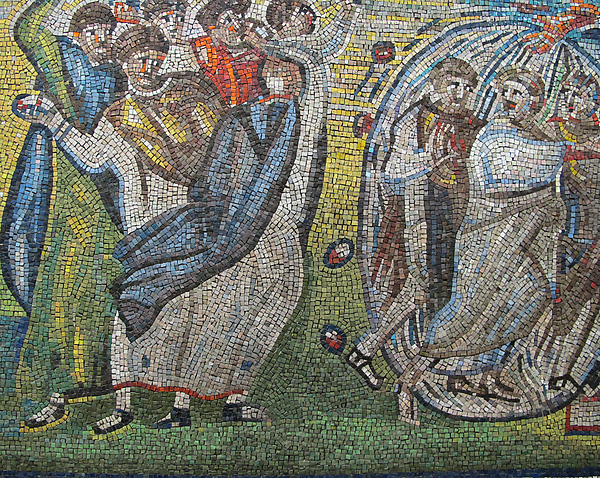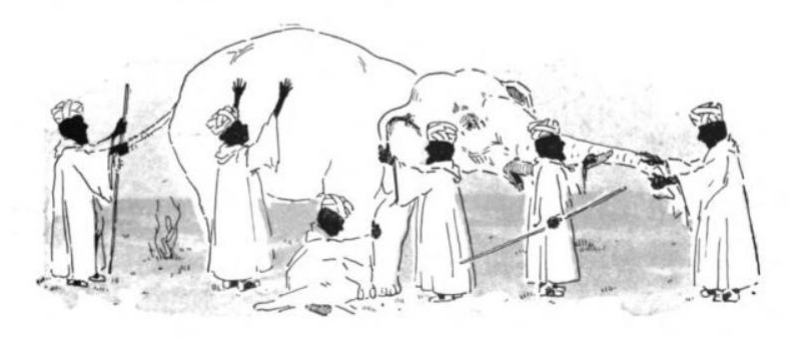

Reading the Bible can provide you with “the marrow of lions…”
* * * *
Here’s what Isaac Asimov said about “The Book” – and how often it’s been read:
The most influential, the most published, the most widely read book in the history of the world is the Bible. No other book has been so studied and so analyzed and it is a tribute to the complexity of the Bible and the eagerness of its students that after thousands of years of study there are still endless books that can be written about it.* [E.A.]
So even after 2,000 years or so, “there are still endless books that can be written” about the Bible. And – one might add – there could still be endless blogs written about it.
As for the photo caption above, it comes from Romain Rolland’s novel Jean Christophe:
The Bible is the marrow of lions. Strong hearts have they who feed on it… The Bible is the backbone for people who have the will to live.
So that’s one thing this blog will try to do: Help you develop that “marrow of lions.”
To begin with, one key to reading the Bible is to remember that it’s not a history book in “modern sense.” The people who wrote the Bible “lacked the benefit of of modern archaeological techniques, did not have our concept of dating and documentation, and had different standards of what was and not significant in history.” (Asimov.)
Then too it’s important to remember that the people who wrote the Bible had to keep in mind their primary audience. In the case of Moses, that meant his fellow Hebrews who had far less education than he did. As a result, he pretty much had to dumb it down.
 In other words, Moses had to write very carefully. In the first place, he had to make sure his primary audience of soon-to-be desert cut-throats would listen to him. Second, he had to insure they wouldn’t turn and stone him for heresy. [See On Moses getting stoned, including the illustration at left.]
In other words, Moses had to write very carefully. In the first place, he had to make sure his primary audience of soon-to-be desert cut-throats would listen to him. Second, he had to insure they wouldn’t turn and stone him for heresy. [See On Moses getting stoned, including the illustration at left.]
Thus in the Torah – the first five books of the Bible – Moses had to tell the history of the world from its Creation, up to where he and his fellow Hebrews were wandering in the wilderness. In doing so he had to use language and concepts his “relatively-pea-brained contemporary audience could understand.”
The point being: Moses’ ability to “tell the story he wanted was limited to his audience’s ability to comprehend.” (See On the readings for June 15 – Part I.)
Which by the way is also pretty much the problem God has, in trying to communicate with us. (Or that we have when trying to communicate with Him.) See for example Isaiah 55:8-9:
For my thoughts are not your thoughts,
nor are your ways my ways, says the Lord.
That’s a good reason why you’re only cheating yourself if you choose to read and study the Bible only in a strict, narrow, or fundamental way.
One risk is that you create God in the image of you, instead of the other way around. (See Genesis 1:27 and Genesis 5:1.) And you risk limiting your appreciation of the majesty of God – the Force that Created the Universe – to your puny, “pea-brained” ability to comprehend.
So I’d say the better course is to admit that you can never fully comprehend “God.”
But you can try and glimpse Him, albeit “through a glass, darkly.” See 1st Corinthians 13:12:
For now we see only a reflection as in a mirror; then [in heaven] we shall see face to face. Now I know in part; then I shall know fully, even as I am fully known.
 Note first that the “through a glass, darkly” phrase is from the King James Translation. (The one God uses.) But note also that Paul was saying no matter how long we study the Bible and follow The Faith, we can never fully comprehend “God.” (At least not in this “incarnation.”)
Note first that the “through a glass, darkly” phrase is from the King James Translation. (The one God uses.) But note also that Paul was saying no matter how long we study the Bible and follow The Faith, we can never fully comprehend “God.” (At least not in this “incarnation.”)
Which doesn’t mean the effort won’t pay off. (See On the Bible as “transcendent” meditation, and Spiritual boot camp.) Then too, that doesn’t mean the best place to start your Bible training is not to take it literally. Just like Army Basic Training, the best place to start is with the fundamentals: “This is where individuals learn about the fundamentals of being a soldier…”
But no good soldier wants to be stuck as a buck private his whole time “in service.” (Although there are some few who enjoy having no additional responsibility…)
That’s what this blog is about: Developing into more than just someone who knows the bare “fundamentals.” Which is another way of saying that by reading the Bible with an open mind, you can reap its full benefit and do all that God intended for you to do.
To put it yet another way: If those six blind men had gotten together and compared notes, they would have gotten a much better picture of what they were seeking. . .
* * * *

* * * *
First note that I edited and/or updated this post on January 21, 2016. That was in preparation for publishing my fourth collection of blog-posts, also titled “On Reading the Bible.” (Which I haven’t gotten around to yet.) In turn, this post was originally published on July 19, 2014, and was updated and/or edited again on October 22, 2018,
References to posts after July 2014 will be in brackets, as in “[See On Moses getting stoned.].”
* * * *
The upper image is courtesy of Lion – Wikipedia. The caption: “A Male Lion at Bannargatta National Park, Bangalore, India.”
* * * *
[Re: The ancient Hebrews as “desert cut-throats.” From the paragraph beginning “In other words, Moses had to write very carefully.” Note first that this end-note was added as part of the 1/21/16 update, and thus is listed in brackets. As to the reference, see Contradictions Of Christianity – Vanguard News Network Forum, which referred to “Yah being the ancient tribal god of the Habiru Sagaz or Desert Cutthroats, as jews [sic] were known in those times.” The writer also noted the “hypocritical chameleon called Christianity,” which gives a flavor of that writer’s not-so-hidden agenda. Be that as it may, see also Habiru – Wikipedia, noting the name from which “Hebrew” arguably sprang, and also The Mysterious Habiru – The History of Israel. The point being: After 40 years of Wandering in the Wilderness, those ancient Hebrews were not anything “civilized people” would want to mess with. In further words, they were arguably the functional equivalent of the Bedouin – “desert dwellers” – if not today’s Hells Angels, at least in terms of fighting capacity.]
* * * *
* Asimov’s Guide to the Bible (Two Volumes in One), Avenel Books (1981), at page 7, Introduction.
Note also that the term Gospel is from “the Old English gōd-spell . . . meaning ‘good news’ or ‘glad tidings.’ The word comes from the Greek euangelion.” See Gospel – Wikipedia.
Jean-Christophe was a novel – written in 10 volumes and completed in 1912 – that earned Rolland the Nobel Prize for Literature in 1915. As for the quote, see the web article Part VIII – Nystamp.org, under “Conflict with Evolution,” emphasis added. Romain Rolland (1866-1944) was “a French dramatist, novelist, essayist, art historian and mystic,” awarded the Nobel Prize for Literature in 1915 “as a tribute to the lofty idealism of his literary production and to the sympathy and love of truth with which he has described different types of human beings.”
The Isaiah 55 quote is from The Living Bible translation, emphasis added.
The King James Bible image is courtesy of King Jame’s Bible – Image Results.
The lower image is courtesy of Blind men and an elephant – Wikipedia, the free encyclopedia. Wikipedia noted that this parable “has crossed between many religious traditions and is part of Jain, Buddhist, Sufi and Hindu lore.” In the Buddhist version, “The men cannot agree with one another and come to blows over the question of what it is like and their dispute delights the king. The Buddha ends the story by comparing the blind men to preachers and scholars who are blind and ignorant and hold to their own views.” See also Matthew 13:34 (ESV): “All these things Jesus said to the crowds in parables; indeed, he said nothing to them without a parable.“